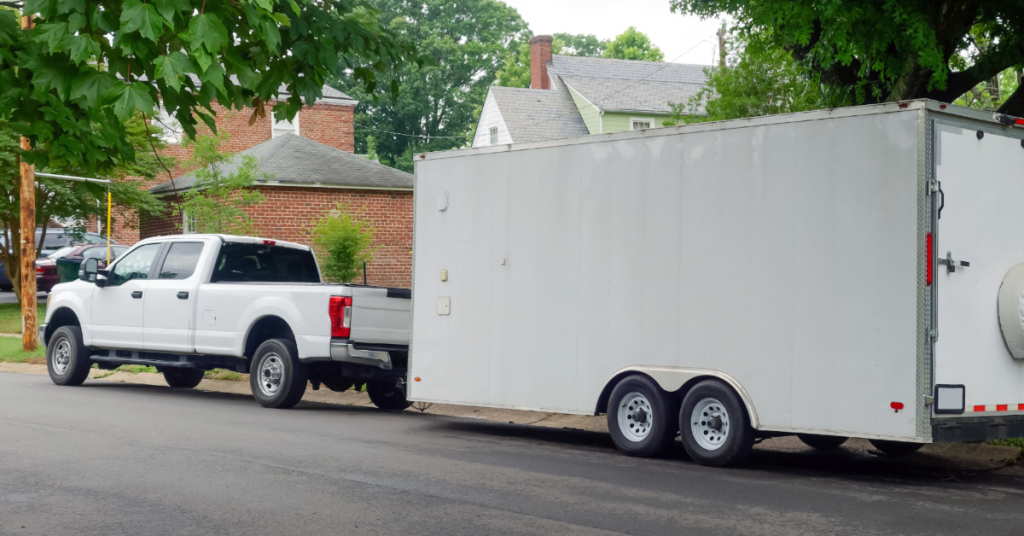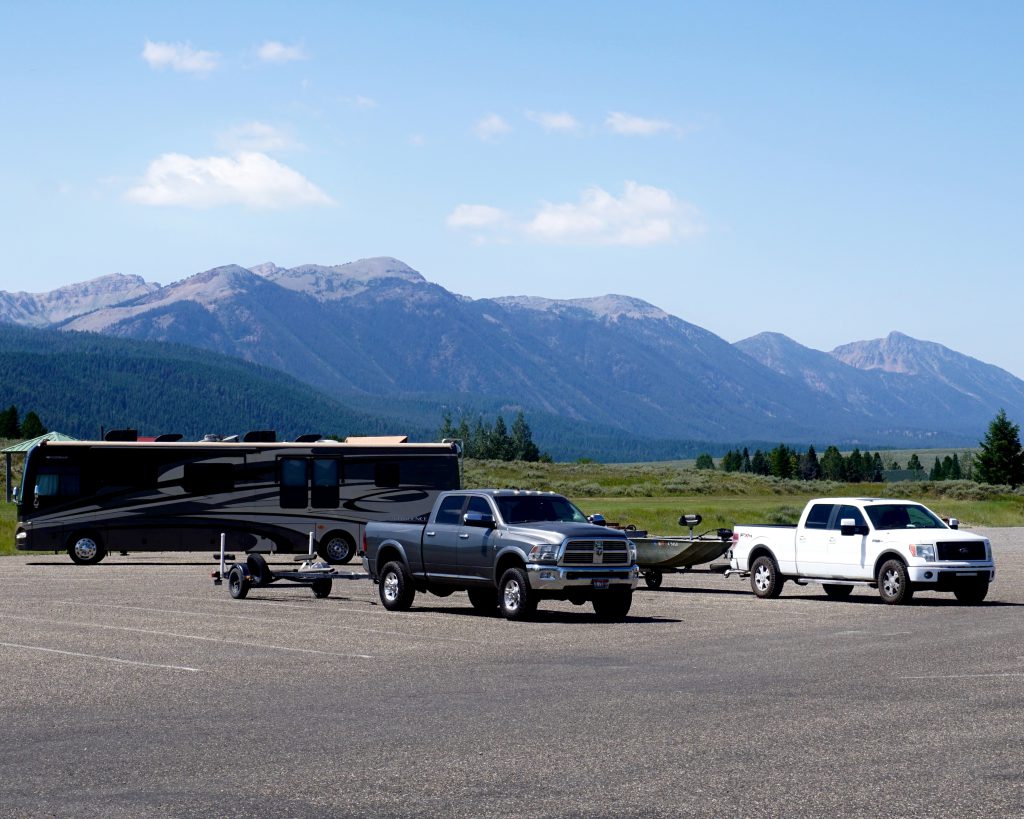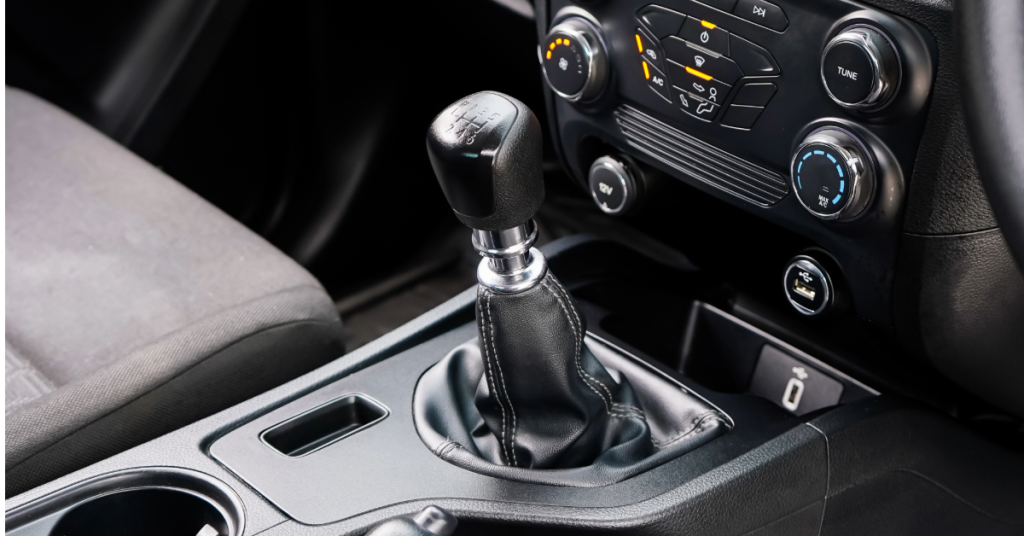Key Takeaways
- Deciphering truck towing capacity and understanding essential terms is key for successful towing.
- Tow vehicle ratings, Gross Vehicle Weight Rating (GVWR), and Gross Combined Weight Rating (GCWR) are important factors in determining the maximum weight a vehicle can safely tow.
- Selecting the right truck model requires balancing its suitability for everyday use with its respective towing power.
Decoding Truck Towing Capacity
The towing capacity of a vehicle is an important parameter that is specified by the manufacturer. It indicates the maximum allowable weight it can tow. Yet, this seemingly simple concept is influenced by a myriad of factors, including:
- Engine power
- Transmission
- Suspension components
- Passengers or cargo
All of these factors play a part in determining how much weight your truck can safely tow.
How do these elements impact a truck’s towing capacity? Begin with understanding Gross Vehicle Weight Rating (GVWR) and Gross Combined Weight Rating (GCWR).
Understanding Gross Vehicle Weight Rating (GVWR)
GVWR is your vehicle’s weight limit, as set by the manufacturer. It includes the weight of the vehicle, all its passengers, and any cargo. Think of it as the truck’s maximum allowable weight. This is critical for towing, as it denotes the maximum load capacity of a vehicle.
It’s much like a backpacker balancing their pack. Just as a hiker must consider the weight of their gear to avoid straining their back, a truck driver must consider GVWR to avoid straining their truck.
Interpreting Gross Combined Weight Rating (GCWR)
While GVWR considers the weight of the vehicle and everything in it, GCWR goes a step further. It’s the maximum permissible weight of both the laden tow vehicle and the loaded trailer. Imagine being the aforementioned backpacker, but now you’re also pulling a sled filled with additional gear. That’s what GCWR accounts for.
When towing, you must stay within the specified GCWR to maintain safety and prevent vehicle damage.
The Role of Tow Vehicle Ratings
Now that we’ve tackled GVWR and GCWR, let’s focus on tow vehicle ratings, also known as tow rating. Established by the manufacturer, they denote the maximum weight that the vehicle can safely tow. Just like an athlete training for a marathon, manufacturers calculate tow vehicle ratings based on a variety of factors, including strength, design, and weight. They test the vehicles extensively to ensure they’re up to the task, just as our marathoner would train for the big race.
These ratings, also known as max tow rating, are vital for a successful and safe max towing experience, as going beyond them can stress the truck’s components and compromise road safety.
Essential Towing Terms Demystified
With GVWR, GCWR, and tow vehicle ratings clarified, you can now learn more about other important towing terms. Understanding these terms is akin to learning a new language. Just as a traveler learns key phrases to navigate a foreign country, understanding these essential terms will help you navigate your towing journey with confidence.
Defining Maximum Towing Capacity
First up is maximum towing capacity. This is the highest weight a vehicle can tow, as specified by the manufacturer. It’s like the maximum weight limit on an elevator. An elevator might be able to hold a certain number of people, but if it’s loaded with heavy luggage, it can’t carry as many passengers. Likewise, a truck’s max towing capacity takes into account the weight of the truck itself, along with any cargo it’s carrying.
Tongue Weight and Its Impact on Towing
Next, we have tongue weight. This is the downward force exerted on the hitch ball by the trailer. Picture a seesaw. If both sides are evenly weighted, it balances perfectly. But if one side is heavier, it tilts.
Tongue weight is all about maintaining that balance to prevent swaying or instability while towing.
The Difference Between Payload and Towing Capacity
Finally, it’s crucial to understand the difference between payload and towing capacity. Payload denotes the weight a vehicle can carry, while towing capacity denotes the weight it can tow. It’s like the difference between what you can carry in your backpack versus what you can pull in a wagon. Both are important capabilities, but they serve different purposes.
Selecting the Right Truck for Your Towing Needs
Equipped with a clear understanding of towing capacity and its determining factors, you are now prepared to choose the appropriate truck for your towing needs. But how do you choose the perfect fit?
Let’s consider the differences between compact trucks and full-size pickups, and when more weight demands more power.
Compact Trucks Versus Full-Size Pickups
Compact trucks and full-size pickup trucks each have their unique perks, much like choosing between a cozy city apartment and a spacious suburban home. Compact trucks are smaller, more fuel-efficient, and generally cheaper. However, full-size pickups offer greater towing capacity and power.
The choice ultimately depends on your specific needs and preferences.
Heavy-Duty Haulers: When More Weight Demands More Power
Sometimes, you need a bit more muscle. That’s where heavy-duty haulers come in. These trucks, with their powerful truck bed, are designed for towing larger loads and offer increased power and capability. They’re like the heavy lifters in a moving crew, capable of handling the bulky, heavy items that the rest can’t.
Towing Accessories and Upgrades
Similar to a chef needing the right utensils for a culinary masterpiece, towing necessitates the correct accessories and upgrades. From trailer tow packages that maximize your truck’s towing capability to gooseneck hitches that unlock additional towing power, let’s explore the tools of the trade.
Trailer Tow Packages: Maximizing Capability
A trailer tow package is like a chef’s special set of knives. It’s designed to enhance your vehicle’s towing capability through features such as:
- Upgraded suspension
- Upgraded cooling systems
- Stabilization features
- Increased towing capacity
- Improved overall towing performance
These packages come with a variety of features that help stabilize the load, increase towing capacity, and improve overall towing performance.
Gooseneck Hitch: Unlocking Additional Towing Power
A gooseneck hitch is like a sturdy handle on a heavy pot, providing additional towing power by distributing weight more evenly and allowing for tighter turning angles.
This type of hitch enhances towing capacity by providing a more secure and stable connection between the truck and the trailer.
Practical Tips for Safe and Efficient Towing
Having covered the theory, we can now discuss practice. Much like a race car driver needs to know the track, a tower needs to know the ins and outs of their vehicle, trailer, and route to ensure a safe and efficient journey.
Proper Vehicle Loading for Balanced Towing
The first step to a successful conventional towing journey is proper vehicle loading. This ensures balanced towing and prevents issues such as trailer sway and poor handling. It’s like packing a suitcase for a trip. You wouldn’t want all your heavy items on one side, causing the suitcase to tip over.
Similarly, proper trailer weight distribution in both your vehicle and your trailer ensures a smoother ride.
Ensuring Your Truck Is Properly Equipped
Just as a hiker wouldn’t venture into the wilderness without the right gear, a tower must ensure their truck is properly equipped for the task at hand. This means having the right hitch, the right wiring, and the right towing accessories. It’s all about being prepared for the journey ahead.
Regular Maintenance for Towing Readiness
Equally important is regular maintenance. Just like you wouldn’t run a marathon without proper training, you shouldn’t tow without ensuring your vehicle is in top shape. Regular maintenance checks, such as checking tire pressure and brake function, are essential for towing readiness.
Towing Capacity Showdown: Popular Truck Models Compared
Having covered the basics, we can now compare some popular truck models. Just like comparing athletes based on their personal bests, we’ll compare these trucks based on their maximum towing capacities.
Bragging Rights: Trucks with Top Towing Capacities
Certain trucks excel in terms of towing capacity. Let’s look at the heavy hitters: the Ford F-150, Ram 1500, and Chevrolet Silverado 1500. These trucks boast the highest towing capacities, making them the MVPs of the towing world.
Balancing Towing Power with Everyday Use
But towing capacity isn’t everything. Just like an athlete needs to balance their training with rest and recovery, truck owners need to balance their towing power with everyday use.
Factors such as fuel efficiency, ride comfort, and overall versatility can’t be overlooked.
Summary
In the world of towing, knowledge is power. From understanding key terms to selecting the right truck and accessories, each step of the journey plays a vital role in ensuring safe and efficient towing. Whether you’re a seasoned pro or a towing novice, this guide provides the insights you need to maximize your haul.
Frequently Asked Questions
How do I know my truck towing capacity?
To find your truck’s towing capacity, check the owner’s manual or subtract your truck’s curb weight from its Gross Combined Vehicle Weight Rating (GCVWR). This GCVWR is the maximum weight of your loaded truck and trailer combined.
What truck has the highest towing capacity?
The truck with the highest towing capacity for 2023 is the Ford F-250 Super Duty, offering a maximum of 37,000 lbs. This model stands out among other options for its impressive strength and reliability.
Can a Ram 1500 tow 10000 lbs?
Yes, the RAM 1500 is capable of towing up to 12,750 lbs. with its V8 HEMI engine, easily surpassing the 10,000 lbs. mark.
What is the difference between GVWR and GCWR?
GVWR is the maximum weight a vehicle can carry, including passengers, cargo, and itself, while GCWR is the total weight of the vehicle and trailer, including cargo and passengers.
What’s tongue weight and why is it important?
Tongue weight is the downward force exerted by a trailer on a hitch and it is important for vehicle stability and control during towing.












